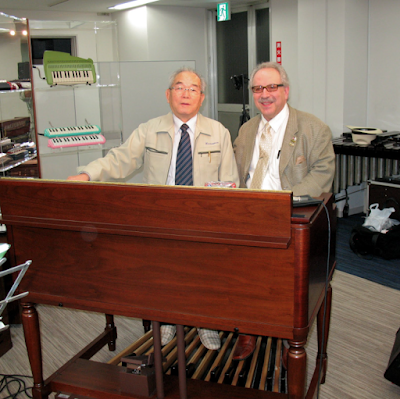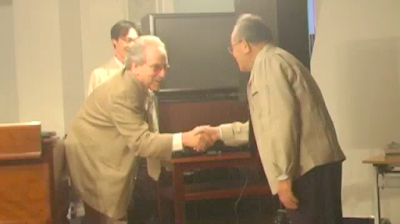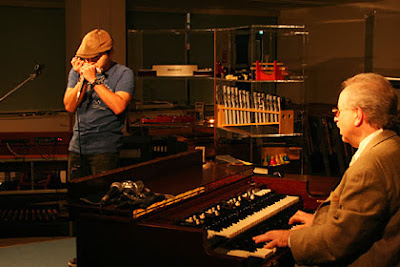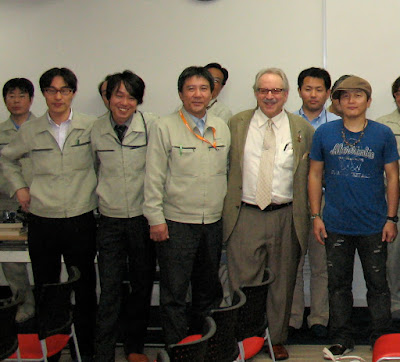Manji Suzuki, CEO, Chairman, Suzuki Musical Insts. Mfg., Co., Ltd.
 Left Kawai in 1952, he founded Suzuki Gakki Seisakusho two years later to build his beloved
harmonica. Demands for harmonica dramatically grew at school as Course of Study regulated harmonica as one of key materials for music education at
elementary and junior high school. It successfully set future course of Suzuki to be a leading educational instrument manufacturer.
Left Kawai in 1952, he founded Suzuki Gakki Seisakusho two years later to build his beloved
harmonica. Demands for harmonica dramatically grew at school as Course of Study regulated harmonica as one of key materials for music education at
elementary and junior high school. It successfully set future course of Suzuki to be a leading educational instrument manufacturer.
In 1961, Suzuki first introduced Melodion, 34-key keyboard harmonica efficiently designed to teach students basics of scale. It was adopted into the Ministry of Education Teaching Materials Standard in 1969.
The Melodion marks 50 years since debut in 2010. A total of 24 million units has been sold with over 50 models to this day.
 Company policy
remains unchanged"In developing products, I'm always concerned about 1. How do music teachers use our instruments in class?, 2. Do children
appreciate them? 3. Do our products effectively serve the purpose of education? When I launched my company, we have set our goal to give children dream and
raise healthy mind through music making. We have shared the 3 points I mentioned at Suzuki from the very beginning.
Company policy
remains unchanged"In developing products, I'm always concerned about 1. How do music teachers use our instruments in class?, 2. Do children
appreciate them? 3. Do our products effectively serve the purpose of education? When I launched my company, we have set our goal to give children dream and
raise healthy mind through music making. We have shared the 3 points I mentioned at Suzuki from the very beginning.
"Educational musical instruments are teaching materials that every child owns. Expensive instruments don't serve the purpose. Consequently, they should be offered at affordable price. How can we build competitive products to meet the requirements? I spend much of my time thinking over these issues. (photo right: Melodion 50th Anniversary models, PRO-37AR, PRO-37AB and PRO-37AS)
When we face challenges, I find solutions and ideas in school. I frequently visit schools throughout Japan because I believe it's the basic to see where music is played. That is the reason why I suggest our people at Suzuki to see what's going on at school themselves with their eyes.
In fact we learn a lot from educational front. Music teachers tell us in detail what we can improve in design and manufacturing. These advices and comments are really valuable. Nevertheless, they are reflected on our future products. The music teachers choose Suzuki instruments because we have responded to their requests. Good communication helped us establish respectable relationship with them. Even when we were unable to comply with their expectation, they understand it was somewhat irrational and we have done our best.
Until 10 years ago, music teachers called me by nickname. Yes, they were our customers, but we shared the passion for quality sound and fine musical instruments. The long-lasting friendly relationship with them helped me to this day. Ideas for new technology come up through the communication with the teachers. They suggest, and the rest is our task. It's amazing that our employees come to think and respond as I do. They understand what I think working together. Consequently, we share ideas without words.
 To tell you
about product development at Suzuki, it's more like meetings of craftsmen rather than of technical engineers. Casual talks finally materialize product
designs. Except pianos and violins, we build almost all educational instruments for school at our factories. The basic of manufacturing musical instrument
is to make original sound. It's standard to all products we make.
To tell you
about product development at Suzuki, it's more like meetings of craftsmen rather than of technical engineers. Casual talks finally materialize product
designs. Except pianos and violins, we build almost all educational instruments for school at our factories. The basic of manufacturing musical instrument
is to make original sound. It's standard to all products we make.  (photos right: from top to
bottom, Manji M-20, S-48S and SU-2 Humming)
(photos right: from top to
bottom, Manji M-20, S-48S and SU-2 Humming)
I founded the company to make my favorite instrument, harmonica. Since the very beginning we took reed technology as the center of our manufacturing. One of our goals is to continue to developing new reed instruments through
extensive study of the core technology.
manufacturing. One of our goals is to continue to developing new reed instruments through
extensive study of the core technology.
Diversified manufacturing in Suzuki group"Suzuki group is consisted of 7 companies each of which has specific role to serve the entire group. I have had personal interest in machinery since young days. In pursuit of manufacturing good quality products in short time, Suzuki has grown to have subsidiaries with differentiated technologies. Tsumori Seiki launched in 1973 designs and develops automated machinery and precision molds. Since we have auto industry in Hamamatsu, the company finds a huge market besides requirements in Suzuki group. Individual subsidiaries have expanded exploring businesses outside of the music products industry accordingly.
"Having many subsidiaries means that I don't have ability to do everything myself. Each subsidiary has experts who help me pursue my interests in various fields. All subsidiaries support and expand businesses of the parent company.
"To offer competitive products to the customers, we must have efficient production system capable of manufacturing high quality products in consistent basis at reasonable price. I'm proud that Suzuki has a host of talented people who love creating things. We are a team of craftsmen. I believe the creative atmosphere prevailing in Suzuki group has greatly contributed to support music education and the growth of our business.
"While manufacturing educational instruments, we have promoted music making among general public. For example, Suzuki Harmonica Society has been active promoting harmonica playing with help of name composers and singer/song writer. Music development is closely associated with promotional activities, and we get feedback from players which are naturally reflected on our product development.
Offer products matched to customers' needs"Sales of Suzuki Melodion keyboard harmonica reached surprising 24 million units. I say, it' an incredible accomplishment. We worked very hard, but were also fortunate because it was associated with Japan's dramatic economic growth of the time.
"We live in an age that we can survive only manufacturing truly innovative, high quality products. I believe recognizing situations we face gives us valuable ideas for product development. NAMM Show, Frankfurt Music Fair and other leading industry events are places of treasure hunting. Seeing products on display is exciting, but it's equally important to watch response of visitors. Visiting the trade shows always provide me with tips for future business. If you have one single product line, it will affect your business in hard times. But you can prepare for economic downturn having new products. I think it's the principle theory for manufacturers.
Take advantage of people power"With declining birth rate, we can't expect number of school age children goes up in coming years. Today, it's about 1.1 million, half from the first baby boom period. We have experienced countless number of hard times in the past. Suzuki had serious difficulties twice. Both cases involved human resource and financial problem. When one of our business partners went bankrupt, we faced a risk of failure though it was rather a small loss. Banks weren't any help but people power relieved us from the adversities.
"I don't think manufacturing things is difficult. Making good harmony of people is harder. it's often out of human control when it comes to people issue. All managers having staff will agree with me.
"I have been in music products industry since I joined Kawai at 15 years old. Launched my company at 27, I have experienced many good and bad times. Looking back to the past, I say this is a very exciting business and feel pleasure to be a member of the industry. At 87 now, I will retire in a year or two. I hope Suzuki's half century-plus history and tradition in manufacturing educational instruments and precious assets of people power continue to work in harmonious way in the years to come.
Suzuki Group
Universe Seiki Co., Ltd. (Manufactures plastic molds, design & production of jigs, products assembly for various industries.)
Tsumori Seiki Co., Ltd. (Design, development and production of automated machinery for various industries.)
Suzuki Educational Software Co., Ltd. (Development of educational, business and home application software.)
Suzuki Music Enterprise Co., Ltd. (Music promotion)
Suzuki Musical Inst. Sales Co., Ltd. (Distribution of Suzuki products in Japan)
Suzuki Corporation (Overseas distribution for Suzuki and Hammond products)
Hammond Suzuki, Ltd. (Music studio operation mainly based on Hammond instruments)
 Left Kawai in 1952, he founded Suzuki Gakki Seisakusho two years later to build his beloved
harmonica. Demands for harmonica dramatically grew at school as Course of Study regulated harmonica as one of key materials for music education at
elementary and junior high school. It successfully set future course of Suzuki to be a leading educational instrument manufacturer.
Left Kawai in 1952, he founded Suzuki Gakki Seisakusho two years later to build his beloved
harmonica. Demands for harmonica dramatically grew at school as Course of Study regulated harmonica as one of key materials for music education at
elementary and junior high school. It successfully set future course of Suzuki to be a leading educational instrument manufacturer.In 1961, Suzuki first introduced Melodion, 34-key keyboard harmonica efficiently designed to teach students basics of scale. It was adopted into the Ministry of Education Teaching Materials Standard in 1969.
The Melodion marks 50 years since debut in 2010. A total of 24 million units has been sold with over 50 models to this day.
 Company policy
remains unchanged"In developing products, I'm always concerned about 1. How do music teachers use our instruments in class?, 2. Do children
appreciate them? 3. Do our products effectively serve the purpose of education? When I launched my company, we have set our goal to give children dream and
raise healthy mind through music making. We have shared the 3 points I mentioned at Suzuki from the very beginning.
Company policy
remains unchanged"In developing products, I'm always concerned about 1. How do music teachers use our instruments in class?, 2. Do children
appreciate them? 3. Do our products effectively serve the purpose of education? When I launched my company, we have set our goal to give children dream and
raise healthy mind through music making. We have shared the 3 points I mentioned at Suzuki from the very beginning."Educational musical instruments are teaching materials that every child owns. Expensive instruments don't serve the purpose. Consequently, they should be offered at affordable price. How can we build competitive products to meet the requirements? I spend much of my time thinking over these issues. (photo right: Melodion 50th Anniversary models, PRO-37AR, PRO-37AB and PRO-37AS)
When we face challenges, I find solutions and ideas in school. I frequently visit schools throughout Japan because I believe it's the basic to see where music is played. That is the reason why I suggest our people at Suzuki to see what's going on at school themselves with their eyes.
In fact we learn a lot from educational front. Music teachers tell us in detail what we can improve in design and manufacturing. These advices and comments are really valuable. Nevertheless, they are reflected on our future products. The music teachers choose Suzuki instruments because we have responded to their requests. Good communication helped us establish respectable relationship with them. Even when we were unable to comply with their expectation, they understand it was somewhat irrational and we have done our best.
Until 10 years ago, music teachers called me by nickname. Yes, they were our customers, but we shared the passion for quality sound and fine musical instruments. The long-lasting friendly relationship with them helped me to this day. Ideas for new technology come up through the communication with the teachers. They suggest, and the rest is our task. It's amazing that our employees come to think and respond as I do. They understand what I think working together. Consequently, we share ideas without words.
 To tell you
about product development at Suzuki, it's more like meetings of craftsmen rather than of technical engineers. Casual talks finally materialize product
designs. Except pianos and violins, we build almost all educational instruments for school at our factories. The basic of manufacturing musical instrument
is to make original sound. It's standard to all products we make.
To tell you
about product development at Suzuki, it's more like meetings of craftsmen rather than of technical engineers. Casual talks finally materialize product
designs. Except pianos and violins, we build almost all educational instruments for school at our factories. The basic of manufacturing musical instrument
is to make original sound. It's standard to all products we make.  (photos right: from top to
bottom, Manji M-20, S-48S and SU-2 Humming)
(photos right: from top to
bottom, Manji M-20, S-48S and SU-2 Humming) I founded the company to make my favorite instrument, harmonica. Since the very beginning we took reed technology as the center of our
 manufacturing. One of our goals is to continue to developing new reed instruments through
extensive study of the core technology.
manufacturing. One of our goals is to continue to developing new reed instruments through
extensive study of the core technology.Diversified manufacturing in Suzuki group"Suzuki group is consisted of 7 companies each of which has specific role to serve the entire group. I have had personal interest in machinery since young days. In pursuit of manufacturing good quality products in short time, Suzuki has grown to have subsidiaries with differentiated technologies. Tsumori Seiki launched in 1973 designs and develops automated machinery and precision molds. Since we have auto industry in Hamamatsu, the company finds a huge market besides requirements in Suzuki group. Individual subsidiaries have expanded exploring businesses outside of the music products industry accordingly.
"Having many subsidiaries means that I don't have ability to do everything myself. Each subsidiary has experts who help me pursue my interests in various fields. All subsidiaries support and expand businesses of the parent company.
"To offer competitive products to the customers, we must have efficient production system capable of manufacturing high quality products in consistent basis at reasonable price. I'm proud that Suzuki has a host of talented people who love creating things. We are a team of craftsmen. I believe the creative atmosphere prevailing in Suzuki group has greatly contributed to support music education and the growth of our business.
"While manufacturing educational instruments, we have promoted music making among general public. For example, Suzuki Harmonica Society has been active promoting harmonica playing with help of name composers and singer/song writer. Music development is closely associated with promotional activities, and we get feedback from players which are naturally reflected on our product development.
Offer products matched to customers' needs"Sales of Suzuki Melodion keyboard harmonica reached surprising 24 million units. I say, it' an incredible accomplishment. We worked very hard, but were also fortunate because it was associated with Japan's dramatic economic growth of the time.
"We live in an age that we can survive only manufacturing truly innovative, high quality products. I believe recognizing situations we face gives us valuable ideas for product development. NAMM Show, Frankfurt Music Fair and other leading industry events are places of treasure hunting. Seeing products on display is exciting, but it's equally important to watch response of visitors. Visiting the trade shows always provide me with tips for future business. If you have one single product line, it will affect your business in hard times. But you can prepare for economic downturn having new products. I think it's the principle theory for manufacturers.
Take advantage of people power"With declining birth rate, we can't expect number of school age children goes up in coming years. Today, it's about 1.1 million, half from the first baby boom period. We have experienced countless number of hard times in the past. Suzuki had serious difficulties twice. Both cases involved human resource and financial problem. When one of our business partners went bankrupt, we faced a risk of failure though it was rather a small loss. Banks weren't any help but people power relieved us from the adversities.
"I don't think manufacturing things is difficult. Making good harmony of people is harder. it's often out of human control when it comes to people issue. All managers having staff will agree with me.
"I have been in music products industry since I joined Kawai at 15 years old. Launched my company at 27, I have experienced many good and bad times. Looking back to the past, I say this is a very exciting business and feel pleasure to be a member of the industry. At 87 now, I will retire in a year or two. I hope Suzuki's half century-plus history and tradition in manufacturing educational instruments and precious assets of people power continue to work in harmonious way in the years to come.
Suzuki Group
Universe Seiki Co., Ltd. (Manufactures plastic molds, design & production of jigs, products assembly for various industries.)
Tsumori Seiki Co., Ltd. (Design, development and production of automated machinery for various industries.)
Suzuki Educational Software Co., Ltd. (Development of educational, business and home application software.)
Suzuki Music Enterprise Co., Ltd. (Music promotion)
Suzuki Musical Inst. Sales Co., Ltd. (Distribution of Suzuki products in Japan)
Suzuki Corporation (Overseas distribution for Suzuki and Hammond products)
Hammond Suzuki, Ltd. (Music studio operation mainly based on Hammond instruments)
 Jon Hammond at the Organ and Microphone
Jon Hammond at the Organ and Microphone













